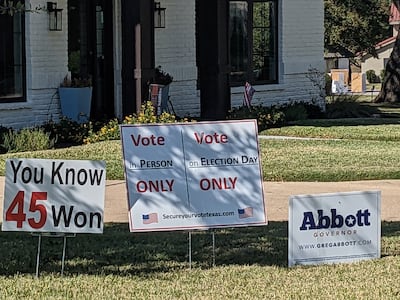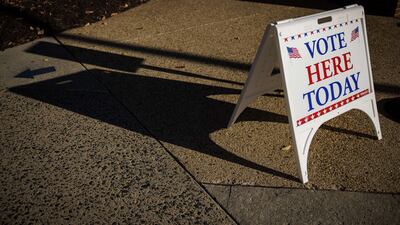If you want to know how the battle for the US midterm elections is being fought, you don't need to look at the higher-profile races such as those in Georgia or Pennsylvania — a small, local election in Tarrant County, Texas, will give you just as clear a picture.
The vote is for the position of county judge, a largely administrative role that happens to include some powers related to the conducting of elections.
And this is why the stakes are much higher than the title suggests. On the line are the fundamentals of any democratic system: faith in the electoral process and the peaceful transfer of power.
Tarrant County's Republican nominee Tim O’Hare is a hard-core supporter of former president Donald Trump, and, if elected, he has vowed to hire an “election integrity officer” who will be charged with sniffing out electoral fraud.
The paranoia around “election integrity” is a direct result of the hysteria over election denial. In the midterms, it is being used both as a tactic and a weapon across the country.
The polling site FiveThirtyEight counted at least 27 candidates running for office in Texas who are election deniers or doubters — and this is only among the 40 running for higher-level positions.
Nationwide, of the 552 Republicans running, 199 are in no doubt that the 2020 election was stolen; another 61 doubt its integrity.
FiveThirtyEight reported than about a quarter of the deniers/doubters have more than a 95 per cent chance of winning.
In Tarrant County, a quiet suburb of Dallas, the yard signs leave you in no doubt about local voter sentiment.

The fear and anger over the “stolen” 2020 election is something Mr O’Hare and others like him have tapped into.
On his campaign website, Mr O'Hare says: “Guarding the security of our ballot box and guaranteeing the legitimacy of our elections is fundamental to preserving a free society.
“The election integrity officer will also seek to find and uncover election fraud. Any election fraud discovered by the election integrity officer would be reported to the sheriff and the district attorney and prosecuted as the DA sees fit.”
The National reached out to his campaign for comment but did not receive a response.
There is a direct line upwards from a proclamation like Mr O'Hare's.
One of the country's most famous election deniers is Texas Attorney General Ken Paxton, who tried to mobilise the support of other states in his campaign to have President Joe Biden’s electoral victory reversed.
The National asked Mr Paxton's office for comment on election fraud but received no response.
Mr Paxton, who is now running for a third term, is under investigation by the FBI into abuse of office and has also been indicted in a securities fraud case.
“A key priority of the attorney general is to investigate and prosecute the increasing allegations of voter fraud to ensure election integrity in Texas,” the attorney general's official website says.
The website also lists the office's successful prosecutions. In the past 17 years, it says, the Texas attorney general has prosecuted 155 people for election fraud, with 386 active investigations.
Texas has 17.1 million registered voters. Another four million are eligible to vote. But even though fewer than 200 people out of a possible 20 million or so voters have been prosecuted, the idea of “widespread” fraud has become dogma among Republicans.
Local officials have learnt to mix denial in with deniability, a tactic that serves the purpose no matter what the outcome: if you lose, you cry fraud, further eroding faith in the process; if you win, you credit the measures you supposedly put in place.

The American system never legislated for actors such as Mr Trump, who tried to upend an election by sending fake electors to the Electoral College and directly asking officials to “find” him the votes he needed to win — and then fomenting an insurrection when all else failed.
But this election throws up the possibility of pliant officials being elected and primed for 2024. In places such as Tarrant County, votes could, conceivably, get thrown out.
What is apparent is that a serious attempt is being made to effectively repopulate the system so that only one side can win.
Even as the ground battle is being fought, prominent Republican candidates are upfront about their larger goals.
Tim Michels, running for governor of Wisconsin, summed it up earlier this week: if he wins, he said, the party “would never lose another election” in the state.
Mr Michel’s campaign tried to walk back the comment, but Republican candidates across the country, whether running for county judge or secretary of state, may well be whispering the same promise — or threat — to voters.










